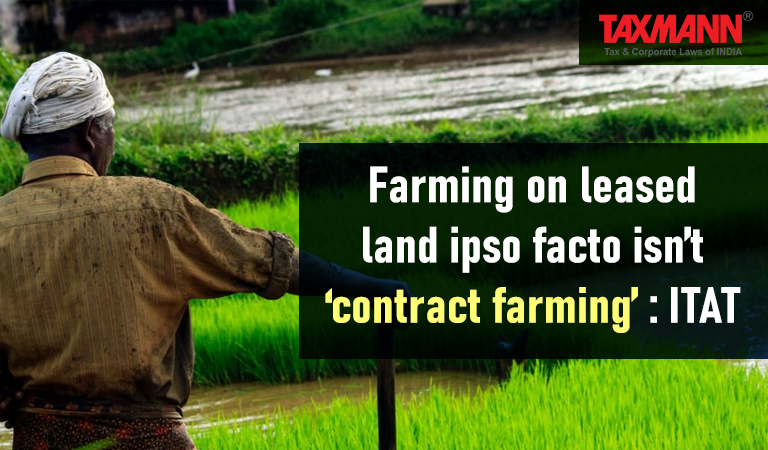Farming on leased land ipso facto isn’t ‘contract farming’: ITAT
- Blog|News|Income Tax|
- 2 Min Read
- By Taxmann
- |
- Last Updated on 1 November, 2022

Case Details: Profarm Seed India (P.) Ltd. v. ITO - [2022] 143 taxmann.com 393 (Hyderabad-Trib.)
Judiciary and Counsel Details
-
- K. Narasimha Chary, Judicial Member & Rama Kanta Panda, Accountant Member
- Kumar Pal Tated, AR for the Appellant.
- KPRR Murthy, DR for the Respondent.
Facts of the Case
Assessee-company was engaged in the business of production of foundation seeds and hybrid seeds on agricultural land obtained under the lease. The assessee filed the return of income for the relevant assessment year considering its income as agriculture income and claimed exemption under section 10(1).
However, Assessing Officer (AO) contended that the assessee takes the agricultural land on lease to develop the foundation seeds and considered it to be in the nature of Contract Farming. Also, the production of hybrid seeds is not natural but involved scientific procedures. Thus, he considered it in the nature of business income and denied the exemption under section 10(1). Aggrieved by the order of AO, the assessee preferred an appeal to the CIT(A).
On appeal, CIT(A) passed the order in favour of the assessee and the matter reached the Hyderabad Tribunal.
ITAT Held
The Tribunal held that there was no dispute that the assessee took the agricultural lands on lease and conducted normal agricultural operations to produce the hybrid variety of foundation seeds in order to sell them in the open market to the seed industries, and in that pursuit, they engaged the labour, supervisors, etc.
The assessee produced voluminous record to show the engagement of labour and the payment of salaries to the supervisors apart from producing the agreements with the landowners.
Merely because the assessee took the land on lease for conducting their research operations to produce the foundation seeds of the hybrid varieties, such a lease cannot ipso facto make the operations of the assessee as contract farming. Further, the fact that foundation seeds of hybrid varieties are produced as per customer requirements will also not make it a case of contract farming.
Contract farming case would be that if the assessee outsources the agricultural operations which they are doing for themselves now, to some other third party. Thus, AO erroneously jumped to the conclusion that the nature of work conducted by the assessee falls under the category of contract.
Disclaimer: The content/information published on the website is only for general information of the user and shall not be construed as legal advice. While the Taxmann has exercised reasonable efforts to ensure the veracity of information/content published, Taxmann shall be under no liability in any manner whatsoever for incorrect information, if any.

Taxmann Publications has a dedicated in-house Research & Editorial Team. This team consists of a team of Chartered Accountants, Company Secretaries, and Lawyers. This team works under the guidance and supervision of editor-in-chief Mr Rakesh Bhargava.
The Research and Editorial Team is responsible for developing reliable and accurate content for the readers. The team follows the six-sigma approach to achieve the benchmark of zero error in its publications and research platforms. The team ensures that the following publication guidelines are thoroughly followed while developing the content:
- The statutory material is obtained only from the authorized and reliable sources
- All the latest developments in the judicial and legislative fields are covered
- Prepare the analytical write-ups on current, controversial, and important issues to help the readers to understand the concept and its implications
- Every content published by Taxmann is complete, accurate and lucid
- All evidence-based statements are supported with proper reference to Section, Circular No., Notification No. or citations
- The golden rules of grammar, style and consistency are thoroughly followed
- Font and size that’s easy to read and remain consistent across all imprint and digital publications are applied



 CA | CS | CMA
CA | CS | CMA
